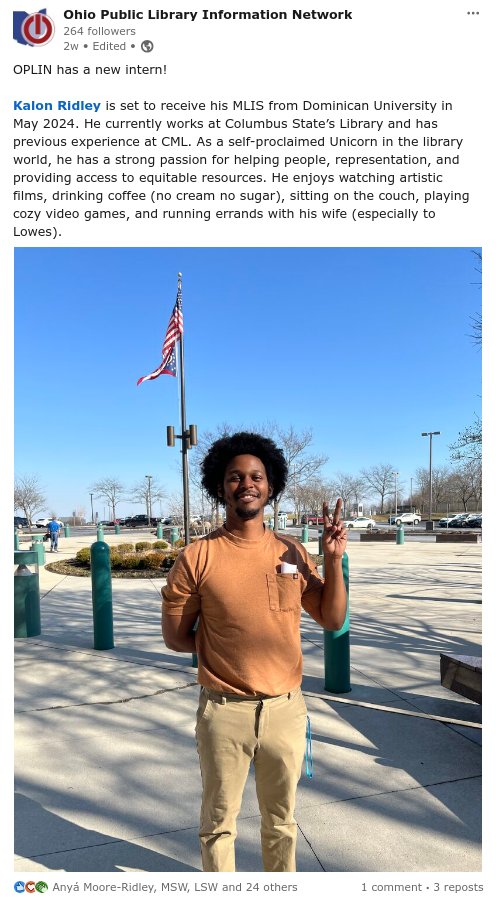Goal One
Develop a professional identity and philosophy within the library and information professions.
Outcome 1a
Describe the evolving nature of the core values and ethics within diverse information environments.
This artifact comes from LIS 770, Management of Libraries and Information Centers. In this assignment, we were given the option to choose one of 6 prompts to craft a research paper around. I chose the topic: “[Provide] an in-depth analysis of a (one) current issue or trend in the management of libraries, information centers, knowledge centers, archives, museums, etc”. My paper outlines the dangers of neutrality in a nation that is historically unkind to BIPOC and offers solutions to bend towards an equitable neutral .
This artifact aligns with outcome 1a because it takes on neutrality a core value of librarianship. Neutrality is an ever-changing value of librarianship that has a meaning that changes with each-person, location and era. With the recent attacks on books and libraries it has evolved to a very hot-button topic because of the varying views and the role that libraries should play in it.
Outcome 1b
Demonstrate how a philosophy, theory, model, and/or major perspective of the library and information profession guides practice in diverse settings.
In LIS 707, Leadership, Marketing and Strategic Communication, we were assigned a Strategic Communication Case Study . We were given the role of Director of Middletown Public Library and tasked with writing a position statement for the MPL Board of Trustees addressing what the library has done (programs, collections) to promote anti-racism and proposing how these efforts might continue in the future, despite push back. To better immerse ourselves we were given the population size and background of Middletown (such as educational, racial, political, and economic, and educational background). As well as our professional experience and personal life background and the surrounding area Colleges & Universities.
This artifact takes Critical Race Theory and examines how it can inform collection development and library services. By focusing on increasing the variety of materials with BIPOC protagonists and authors, offering multilingual resources, and intentionally displaying a more diverse collection, we can promote equity and bring awareness to racial inequalities. Additionally, by highlighting counter-narratives and diverse perspectives, we are able to connect CRT directly to the work of libraries and librarianship, directly addressing Learning Outcome 1b.
Outcome 1c
Participate in professional activities and associations, such as professional conferences and meetings, internships and practicums, and professional email discussions and social media.
To showcase my engagement in professional activities, I’m including the announcement of my internship with the Ohio Public Library Information Network (OPLIN). This ongoing experience offers valuable insights into the critical role OPLIN plays in supporting Ohio’s public libraries. My interactions with library professionals across the state provide a broader perspective on the needs and challenges they face, as well as providing insights into the funding landscape and grant processes for public libraries and non-profits. Through these connections, I’m learning about the importance of library network infrastructure, digital resources, and website management. These interactions are fostering professional relationships and expanding my understanding of the library field, solidifying my desire for a career focused on the behind-the-scenes work that ensures libraries operate efficiently.

The Ohio Public Library Information Network (OPLIN, pronounced “OH-plin.”) is an independent agency within the State Library of Ohio. OPLIN provides internet connectivity, training, and resources to public libraries across Ohio, helping to facilitate access to information for Ohio residents. Its mission is to “Ensure equity of access to digital information for all residents of Ohio” (Ohio Rev. Code 3375.64).